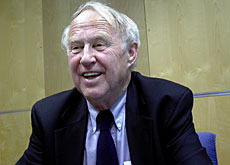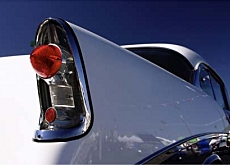How the Swiss seized their New World chances

Swiss emigration to the United States was largely due to people seeking their fortunes in new pastures, migration expert Leo Schelbert tells swissinfo.
Schelbert, who was recently awarded this year’s Swiss expatriate prize in recognition for his work on Swiss emigration to the US, says poverty was not necessarily the driving factor.
Around one million people who live in the US are estimated to have Swiss roots. Many are descended from settlers who emigrated to the country in the 19th century.
They mostly went to Pennsylvania and the Carolinas, as well as in the Midwestern states. Some communities, such as New Glarus in Wisconsin, still bear witness to their Swiss origins.
Schelbert, who is emeritus professor at University of Illinois at Chicago, has lived in the United States for more than 40 years.
swissinfo: Why did the Swiss originally emigrate to the US?
Leo Schelbert: Because the Swiss, like any other people, will take advantage of opportunities abroad.
For the wealthy it was the entrepreneurial possibilities, for the middleclass and especially in 18th century where in Switzerland and in Europe mechanisation was destroying the artisan culture, it was a way of finding jobs.
On a personal level you have every motivation you can think of, for family reasons or for escaping the law… or perhaps even fate.
swissinfo: So poverty was not a driving factor?
L.S.: The history of emigration is always interpreted as a crisis phenomenon, with poverty as its cause. In my opinion this is wrong, as the poor did not emigrate as they didn’t have the money.
People who have lost their positions emigrate, for example in Glarus when the home textile industry collapsed.
I did an informal study of 5,000 Swiss names and their professions registered in the US in 1915. Around three per cent were wealthy and 40-50 per cent were middle class.
However, emigrants were often robbed in port towns and during the crossings and in the end arrived penniless.
swissinfo: How Swiss are the one million Americans with Swiss ancestry?
L.S.: We cannot say that these people feel Swiss. They are 99.9 per cent Americans or maybe the dominant part of their background is German, Irish or Polish. There is, however, probably a percentage with a genuine dominant Swiss element.
swissinfo: Are there pockets of Swiss descendants who have remained close to their roots?
L.S.: The one that is always mentioned is New Glarus. Some say it is a tourist trap. You do have, of course, the false house fronts as if chalets would equal Swiss and the folklore is in rather an imagined form. But on the other hand there is also a genuine tradition there.
I once went to New Glarus with a Swiss friend and [we saw that] they had replaced a wonderful photograph of Switzerland with a very kitschy one, so I asked her what should we do and she said, very wisely, leave them alone!
swissinfo: Have Swiss immigrants had any influence on US culture?
L.S.: I prefer the term enmeshed or involved in the culture. For example, Fritz Zwicky was a major discoverer of supernova [when he worked in California] but his discovery is part of astrophysics in the western culture.
One cannot say the Swiss founded the US or anything like that. Swiss from all backgrounds became enmeshed with all the good, the bad and everyday things of the country.
swissinfo: What about modern day Swiss immigrants?
L.S.: Relatively few have become immigrants. They are more like temporary migrants because of globalisation.
Various major corporations, like UBS, have offices all over the world. They use people on the spot, but they also want managers from their home country, so people may go abroad for three years. So we should talk today mostly of migration and not immigration.
swissinfo-interview: Isobel Leybold-Johnson
Leo Schelbert, emeritus professor of history at the University of Illinois at Chicago, emigrated to the US in the 1960s.
His publications include “Swiss Migration to America. The Swiss Mennonites” and “New Glarus. The Making of a Swiss American Town”.
He uses Swiss emigration as a testing group for his theories on migration. For him, emigration must be considered in close conjunction with the immigration to and the internal migration within the home country.
The Swiss expatriate prize is awarded annually by the centre-right Radical Party as a way of supporting the Swiss abroad.
There are an estimated 1 million people with Swiss roots in the United States.
More than 5,000 places have Swiss names.
Swiss traditions continue: Swiss-style cheese is celebrated in New Glarus and at the “Green County Cheese Days” in Monroe.
A Swiss wine festival is held in Vevay, in the appropriately named Switzerland County.

In compliance with the JTI standards
More: SWI swissinfo.ch certified by the Journalism Trust Initiative



You can find an overview of ongoing debates with our journalists here. Please join us!
If you want to start a conversation about a topic raised in this article or want to report factual errors, email us at english@swissinfo.ch.